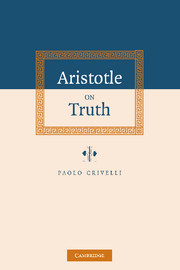Book contents
- Frontmatter
- Contents
- Acknowledgements
- Notes on the text
- List of abbreviations of titles of Aristotle's works
- Introduction
- Part I BEARERS OF TRUTH OR FALSEHOOD
- Part II ‘EMPTY’ TERMS
- Part III TRUTH AND TIME
- Chapter 6 Truth and change
- Chapter 7 Truth and Determinism in de Interpretatione 9
- Appendix 1 Metaph. Θ 10, 1051b1: the text
- Appendix 2 Metaph. Θ 10, 1051b2–3: the text
- Appendix 3 Int. 7, 17b16–18: the text
- Appendix 4 The two-place relations in Aristotle's definition of truth
- Appendix 5 Aristotle's theory of truth for predicative assertions: formal presentation
- Appendix 6 The failure of bivalence for future-tense assertions: formal presentation
- References
- Index of names
- Index of subjects
- Index of passages
Chapter 7 - Truth and Determinism in de Interpretatione 9
Published online by Cambridge University Press: 22 September 2009
- Frontmatter
- Contents
- Acknowledgements
- Notes on the text
- List of abbreviations of titles of Aristotle's works
- Introduction
- Part I BEARERS OF TRUTH OR FALSEHOOD
- Part II ‘EMPTY’ TERMS
- Part III TRUTH AND TIME
- Chapter 6 Truth and change
- Chapter 7 Truth and Determinism in de Interpretatione 9
- Appendix 1 Metaph. Θ 10, 1051b1: the text
- Appendix 2 Metaph. Θ 10, 1051b2–3: the text
- Appendix 3 Int. 7, 17b16–18: the text
- Appendix 4 The two-place relations in Aristotle's definition of truth
- Appendix 5 Aristotle's theory of truth for predicative assertions: formal presentation
- Appendix 6 The failure of bivalence for future-tense assertions: formal presentation
- References
- Index of names
- Index of subjects
- Index of passages
Summary
In chapter 9 of de Interpretatione (henceforth ‘Int. 9’) Aristotle claims that some future-tense singular assertions are sometimes neither true nor false, and therefore refute Bivalence, the principle stating that every assertion is always either true or false. Aristotle's argument goes as follows:
If every future-tense singular assertion is always either true or false, then whatever happens was always antecedently bound to happen, i.e. Determinism holds; but it is not the case that whatever happens was always antecedently bound to happen; hence, not every future-tense singular assertion is always either true or false, i.e. some future-tense singular assertions are sometimes neither true nor false.
Int. 9 divides into four parts: the first (18a28–33) is introductory (it briefly states Aristotle's position); the second (18a34–18b25) contains two arguments from Bivalence to Determinism; the third (18b26–19a22) argues that Determinism is absurd; the fourth (19a23–19b4) contains Aristotle's solution to the problems raised by Bivalence and Determinism.
In section 1 of the present chapter I present the most important modal attributes and theses at play in Int. 9: the attribute of necessity as ineluctability (a diachronic modality, with two ‘slots for dates’), the thesis of the necessity of the present and the past (the thesis that for whatever obtains at any time it is both then and later necessary to obtain then), and Determinism (the thesis that for whatever obtains at any time it is always antecedently necessary to obtain then). Aristotle endorses the necessity of the present and the past, but rejects Determinism.
- Type
- Chapter
- Information
- Aristotle on Truth , pp. 198 - 233Publisher: Cambridge University PressPrint publication year: 2004



